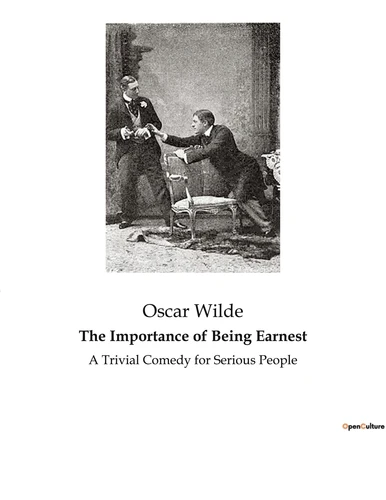The Importance of Being Earnest, A Trivial Comedy for Serious People is a play by Oscar Wilde. First performed on 14 February 1895 at the St James's Theatre in London, it is a farcical comedy in which the protagonists maintain fictitious personae to escape burdensome social obligations. Working within the social conventions of late Victorian London, the play's major themes are the triviality with which it treats institutions as serious as marriage, and the resulting satire of Victorian ways.
Some contemporary reviews praised the play's humour and the culmination of Wilde's artistic career, while others were cautious about its lack of social messages. Its high farce and witty dialogue have helped make The Importance of Being Earnest Wilde's most enduringly popular play. The successful opening night marked the climax of Wilde's career but also heralded his downfall. The Marquess of Queensberry, whose son Lord Alfred Douglas was Wilde's lover, planned to present the writer with a bouquet of rotten vegetables and disrupt the show.
Wilde was tipped off and Queensberry was refused admission. Their feud came to a climax in court when Wilde sued for libel. The proceedings provided enough evidence for his arrest, trial and conviction on charges of gross indecency. Wilde's homosexuality was revealed to the Victorian public and he was sentenced to two years imprisonment with hard labour. Despite the play's early success, Wilde's notoriety caused the play to be closed after 86 performances.
After his release from prison, he published the play from exile in Paris, but he wrote no more comic or dramatic works.
The Importance of Being Earnest, A Trivial Comedy for Serious People is a play by Oscar Wilde. First performed on 14 February 1895 at the St James's Theatre in London, it is a farcical comedy in which the protagonists maintain fictitious personae to escape burdensome social obligations. Working within the social conventions of late Victorian London, the play's major themes are the triviality with which it treats institutions as serious as marriage, and the resulting satire of Victorian ways.
Some contemporary reviews praised the play's humour and the culmination of Wilde's artistic career, while others were cautious about its lack of social messages. Its high farce and witty dialogue have helped make The Importance of Being Earnest Wilde's most enduringly popular play. The successful opening night marked the climax of Wilde's career but also heralded his downfall. The Marquess of Queensberry, whose son Lord Alfred Douglas was Wilde's lover, planned to present the writer with a bouquet of rotten vegetables and disrupt the show.
Wilde was tipped off and Queensberry was refused admission. Their feud came to a climax in court when Wilde sued for libel. The proceedings provided enough evidence for his arrest, trial and conviction on charges of gross indecency. Wilde's homosexuality was revealed to the Victorian public and he was sentenced to two years imprisonment with hard labour. Despite the play's early success, Wilde's notoriety caused the play to be closed after 86 performances.
After his release from prison, he published the play from exile in Paris, but he wrote no more comic or dramatic works.






















